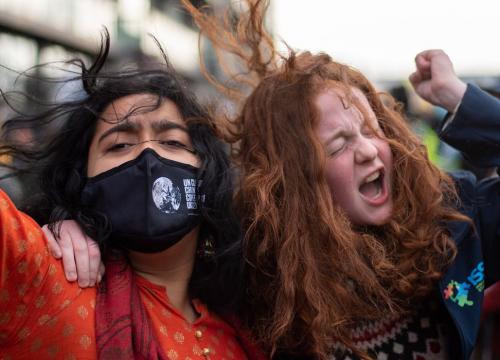
https://www.ohchr.org/en/stories/2023/11/young-people-have-power-climate...
Saoirse Exton began her climate activism well before she was old enough to vote.
What started at age 13 as sit-ins and protests in front of council buildings in her native Limerick, Ireland, soon grew into a campaign that has taken her around the world to demand action on the climate emergency at global summits. Earlier this year, Exton, who is now 18, became the youngest member of the UN Secretary-General’s Youth Advisory Group on Climate Change.
“Young people have power. They can be leaders and lead crowds and advocate for change,” said Exton, who founded her local branch of the Fridays for Future global movement.
Through Tik Tok, lawsuits and loudspeakers, a growing generation of young human rights defenders like Exton are organizing themselves to hold governments and businesses accountable on climate change.
For Exton, it is only natural that youths are on the forefront of a fight they see as an existential one.
“We have inherited a world that is literally being destroyed, and it is really unfair,” she said. “We are the closest to the effects of the climate crisis and the closest to future generations. We are the ones that will have to bear the brunt of the actions of the previous generations.”
Last month, Exton participated in the Regional Dialogue of Europe and Central Asia, organized by UN Human Rights to discuss the right to a clean, healthy and sustainable environment as part of the Human Rights 75 Initiative. Exton used her speech to point her finger at governments and adults for dragging their feet on climate and doing “the bare minimum.”
“We are headed towards a crisis. We have less than six years left to prevent irreversible climate change and we cannot keep up with normal everyday diplomacy. We have to ensure that action is being taken.”
Exton said preventing a climate disaster implies changing our relationship with the planet.
“The planet is used as a resource to generate profit, and we see this in the complete destruction of ecosystems. We need to have more human-centered economics. We need to look at economics through an anthropological lens.”
32 words for field in Irish
As a Gaeilgeoir, an Irish-language speaker, Exton said the wealth of knowledge held in traditional languages and storytelling can re-establish the concept of Earth as sacred.
“My ancestors always had this feeling of connection to the land. In Irish there are 32 words for field, and each one describes a different purpose for field. This is something that we have lost and something we can reclaim. As humans we are not above the ecosystem, we are part of the ecosystem.”
As a member of the Secretary-General’s Youth Advisory Group on Climate Change, Exton is tasked with providing practical advice, youth perspectives and recommendations, with a focus on accelerating the implementation of the climate action agenda.
One thing is clear for her: Climate action will not come from business as usual.
“There is this insistence among world leaders to keep the status quo with some tweaks. And that is not going to work. We don’t have a chance. Fighting climate change is a necessity.”
That means also ending the disconnect between words and actions by many governments and businesses.
“It really is about creating legislation that is specific, that is drafted by or made in coordination with indigenous people and young people and communities more affected by climate crisis. There is a lot of rhetoric but little systemic change.”
Exton said young people are often side-lined or treated as “half humans” because they are not yet adults, which she said feeds into a sense of frustration and anger at not being listened to on climate.
So, what can young people do to make themselves heard on climate action? Hold a sign, sit down, protest, take a picture and post it on social media, spread awareness, get involved in a grassroots organization, Exton listed. And when you are old enough to vote, use your democratic rights, she added.
“We are watching. Young people are very aware of what is going on. In democracies, once we are able to vote we will vote out the governments that do not listen to us.”









